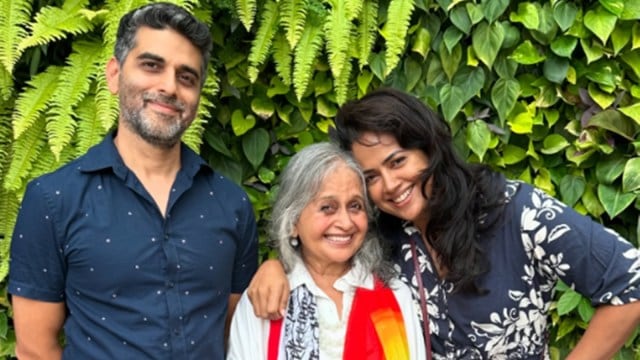📣 For more lifestyle news, click here to join our WhatsApp Channel and also follow us on Instagram
‘It didn’t matter that she was an actress’; Manjri Varde on how financial independence shaped a stronger relationship with daughter-in-law Sameera Reddy
“We didn't have men around telling us what to do…,” Sameera Reddy added.
 Both women emphasised how the absence of male control over their finances (Source: Instagram/Manjri Varde)
Both women emphasised how the absence of male control over their finances (Source: Instagram/Manjri Varde)Financial independence can play a pivotal role in shaping relationships, especially between in-laws.
Manjri Varde aka Sassy Saasu and actor Sameera Reddy‘s mother-in-law, recently shared how her economic security and independence allowed her to build a relationship with Sameera based on equality and mutual respect.
In an interview with Lxme, Varde explained, “I’ve been divorced for a long time. I had my own home, my own home okay. It was in Versova, a beautiful little flat. So economically, I was very independent and very secure. So it didn’t matter that she (Sameera) was an actress. I think that because we are on a forum where we’re talking economics for women, I think that grounding puts us on the same footing. She was earning, I had my own home. I think that worked for me also.”
Both women emphasised the absence of male control over their finances created a space for genuine connection and shared decision-making. Reddy said, “We didn’t have men around telling us what to do, or controlling us or controlling our money,” to which Varde strongly agreed, quipping with a smile, “You did — you had my son.”
View this post on Instagram
Their insights shed light on the significance of financial autonomy for women, not only in personal relationships but also in fostering confidence and agency.
But how does financial independence influence the dynamics of in-law relationships, particularly between women?
Sonal Khangarot, licensed rehabilitation counsellor and psychotherapist, The Answer Room, says, “Financial independence fosters equality in in-law dynamics, especially among women. Manjri Varde’s ownership of her flat and her economic security enabled her to meet Sameera Reddy on equal footing, preventing any imbalance that could arise from Reddy’s celebrity status or economic disparity. This mutual respect reduces conflicts and establishes healthier boundaries. Research from the Journal of Family Issues highlights that economic autonomy enhances respect and family collaboration. Similarly, Indira Nooyi balanced her high-powered career and family life due to her financial independence, earning respect from all quarters.”
Can the absence of male control over finances improve the quality of family communication and decision-making?
When women have control over their finances, Khangarot says, family communication often becomes more transparent and collaborative. “Not having men control their money fosters open communication and stronger decision-making. Families with shared financial responsibility report 30% higher satisfaction in relationships, according to studies.”
 Begin saving and investing as early as possible. (Source: Freepik)
Begin saving and investing as early as possible. (Source: Freepik)
Some practical steps women can take to achieve financial independence in different stages of life
Khangarot suggests taking the following steps:
- Start Early: Begin saving and investing as early as possible. Government schemes like the Sukanya Samriddhi Yojana support young girls’ financial growth.
- Build Skills: Regular upskilling in competitive fields ensures women remain employed and self-reliant.
- Own Assets: Owning property provides long-term stability and a sense of security.
- Invest Wisely: Diversify income through mutual funds, stocks, and fixed deposits to create a reliable portfolio.
- Seek Support: Women-focused cooperatives and professional networks offer mentorship and financial literacy resources.
📣 For more lifestyle news, click here to join our WhatsApp Channel and also follow us on Instagram
- 01
- 02
- 03
- 04
- 05



























